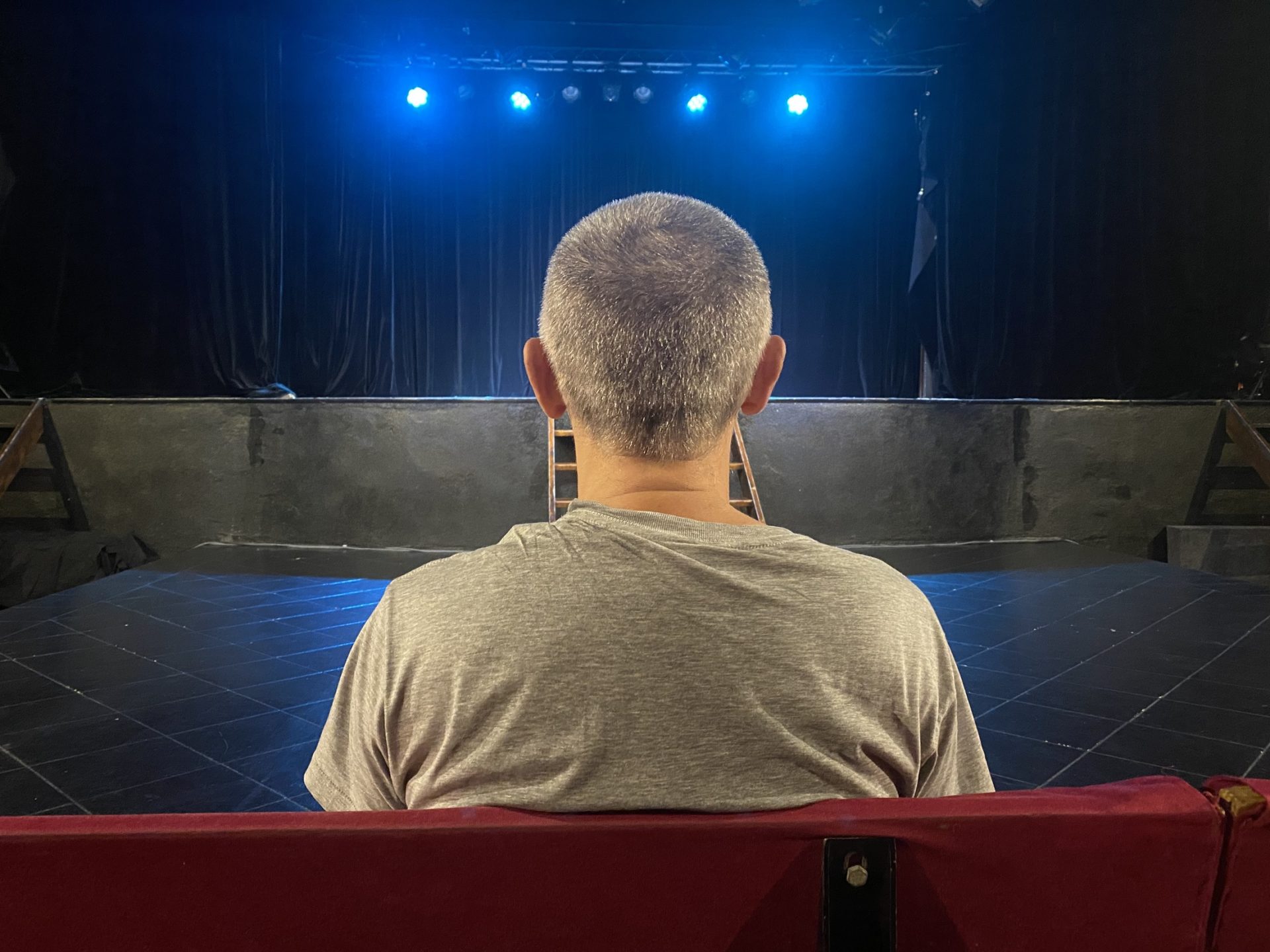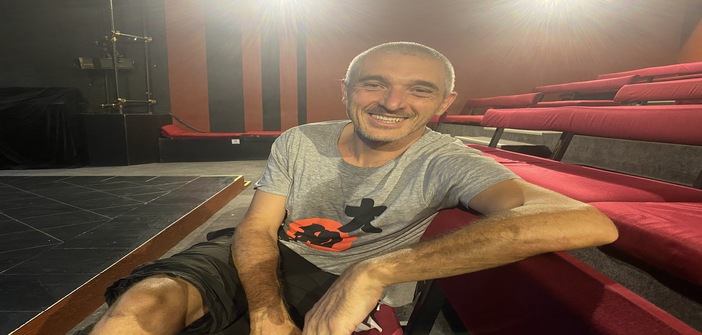As part of the presentation of their play Lily, we met Christophe Caissotti, co-founder of the “Compagnie Un Poisson En Avril”. Accompanied by artist Emilie Pierdas, they have the desire to take on projects that excite them. From the birth of the group to the challenges related to the lockdown, we had an extensive conversation about their passion for the stage.
How was your group founded?
It was Emilie Pierdas who came up with the idea to create this company. She wanted to pursue projects that excited her. It’s true that when you are an actor, until you have your own company, you depend on other people’s ideas. On my side, I wanted to put on shows that I wrote. I wanted to confront that, even at the risk of failure. And that’s how we met. We started on the principle that we would create our own shows. (Lily, a lily pad in my bathtub).
What themes do you like to write and perform?
In general, what I love in my writing is the human element. Humans have actions that sometimes seem selfish or even strange. I always try to see what’s behind. I also try to avoid putting protagonists into boxes. Nothing is completely black and white. I like giving a dark side to the victims. Simply because we are not made of just one element. That depth is what we’re seeking.
How do you approach writing and performing?
Emilie and I mutually propose projects that we execute in harmony by exchanging ideas. When I write, I initially do it on my own without discussing it much. Later, I have it read to get feedback. When you write, you are immersed in your vision of things. That’s why you need to confront it with reality, and that reality is the people who will read it. In a writer’s mind, there’s a logical sequence that can sometimes be forgotten. The most complex part is putting yourself in the reader’s shoes. Afterwards, you mustn’t bore them. A first draft is very recognizable. It’s very explanatory due to the fear of public misunderstanding. You mustn’t dive into an overabundance of descriptions. The number one rule is not to hold the reader’s hand too much; boredom can quickly set in. Thus, it’s about finding a balance because the person reading isn’t inside your head.
Emilie and I are fortunate because we can share our written work with actors. Even at a first reading, an actor can understand which role suits them best.
What are your artistic influences?
I have been significantly influenced by Russian literature. Like everyone, I had to read it in school. However, it was through Russian literature that I learned to love reading. The reason is that the writer pays great attention to the hero’s psychology. This aspect is central to my writing and thought process.
How did the journey of Compagnie Un Poisson En Avril progress from its creation to the lockdown?
When starting a project, there’s an exhilaration. It was while attending a children’s play that I discovered a genuine desire. Emilie was performing in front of them, and watching them laugh, I thought I should create a show for children too because I wanted to see those smiling faces.
Do you only create original works? No adaptations?
Emilie and I ventured into contemporary original theater. There’s a certain excitement in creating. It’s challenging to find that in adaptations.
Which is more difficult, adaptation within a framework or staging an original creation?
I believe it’s more a question of desire. When participating in theater workshops, the path taken is usually adaptation. This is because we want to offer students the pleasure of performing in well-known plays. We can fairly easily get into an author’s mind. But creating something yourself remains a very personal creation.

How did you manage your work during theater closures?
There was a challenging period with canceled dates. Luckily, I was in the middle of writing a play. Emilie was making daily videos. When you’re in theater, you want to be seen, and if you can’t, it becomes problematic.
Under what conditions do you write?
I don’t write at home; I go to the castle or cafes. I like to write amidst people.
Did being confined limit your production? Did not being able to go out block you artistically?
It affected me because when the lockdown was implemented, we were bombarded with information. I decided that I never wanted to speak about that period. In cinema, literature, or theater, you’ll see a lot of content related to those weeks in isolation. I don’t want to add another piece, my goal is elsewhere.
During this period, what concerns did you have and what are they now?
The concern shared by everyone in theater is not knowing if we can perform tomorrow. From one day to the next, everything could close again. It’s tough rehearsing knowing it might be for nothing. Humans need stable foundations, and our biggest fear is not being on stage. On the other hand, we look for ways to reinvent ourselves and there can be a small thrill in that exercise.
Since reopening, how has interacting with the audience been?
Since reopening, we see that there’s a real audience. Distance is maintained in the stands. But when on stage, we don’t notice any difference.
Are you artistically bothered by the masks worn?
No, because we don’t see the audience, we feel them, and nothing has changed. If you will, there is an incredible atmosphere you can feel on stage. The actors have spotlights preventing them from seeing past the first row. You’d have to ask other actors, but for me, the masks aren’t problematic.
Have you received feedback from the audience about the health measures?
No, people adapt. They are quite happy to return to the theater.
What happens if a cast member has Covid?
The rules are the same for everyone. If a cast member tests positive, the performance is canceled.
Your company is currently performing at the Théâtre de la Cité. Could you describe your play?
It’s a youth audience play called Lilly. We wanted to use children’s show standards. It’s about a princess in a castle with her mother, the queen. This young girl is bored and doesn’t know why. Ultimately, what’s interesting is that she has everything she wants, leading to her boredom. Her mother gives her everything she desires but is absent.
In writing, I thought about the fact that children have many activities without their parents. But sometimes all they want is to spend time with them. Often, parents come home with work on their mind, talk about their life’s problems, and the children wait without interaction.
I absolutely avoid moralizing. I didn’t want to make the princess seem like a victim, but there is a message behind it that I don’t want to overemphasize. The audience’s reflection will never be forced.
For children’s shows, do you test what you write on your kids?
We are lucky to have Emilie’s eight-year-old son as our first supporter. Thanks to him, he’s our supreme tester (laughs).
Where can we find your company in Nice and its surroundings?
It depends on the dates we find. This Wednesday the 7th, we are in Nice, and the following week in Bon Voyage. We perform throughout the department. For now, it’s a bit complex because, as I told you, we don’t know if the future is certain.
What are your short, medium, and long-term future projects?
The big project of the company is Jack the Ripper. We need to find partners to bring it to life. Then we have a Christmas show. Somewhere we have to have several offerings. Afterward, we prefer not to talk about what isn’t concrete. It’s important to be patient.
If you were to talk to our readers, what would you say?
Come to the theater. We need spectators and support. Today, stand-up is trendy. Take the risk of attending even what you’re less inclined to see. It’s important to try to be surprised. The proximity with actors can bring you emotions you won’t find elsewhere.




